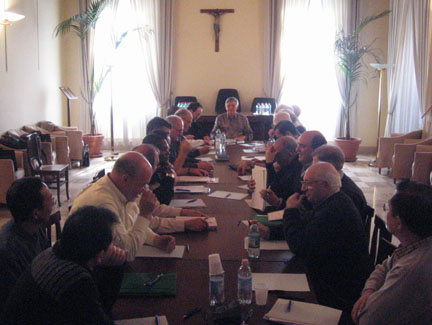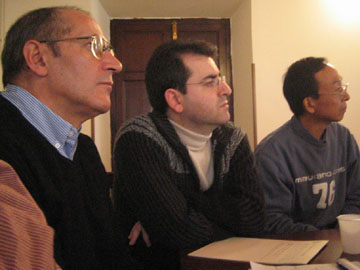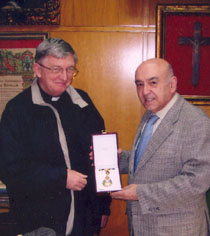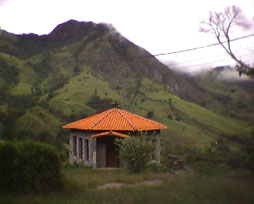|
no. 2 april - june 2006
Twenty-three Carmelites from around the world gathered in the conference room of the Domus Carmelitana in Rome to discuss common projects and to foster working together. The International Commission for Formation and the Commission for the Study of the Spirituality and Charism of the Order met with the members of the General Council for two hours and then shared a meal together. The Prior General, Joseph Chalmers, welcomed the groups. In his brief opening remarks he encouraged the formulation of proposals for the 2007 General Chapter. He also highlighted points raised during last September’s General Congregation which touched upon the responsibilities of the two commissions: a second novitiate, completion of the Ratio Studiorum, development of concrete processes for on-going formation to take place in the provinces, and the study of languages to facilitate communications within the Order. He also spoke about the up-coming meeting of the Union of Superiors General (USG) regarding the promotion of perseverance in the Orders’ formation programs. The open discussion which followed initially centered on what is commonly called the Directory Project—a multi-step process promoting the re-discovery and promoting of the charism of the Order, the study of the Carmelite spiritual tradition, and the publication of texts and translations of some aspects of our tradition and spirituality. Many of the reflections on specific topics have been published in the various languages. The Order now needs to recapture the original concept of promoting discussion of these themes. The commissions are proposing doing this through the use of the new technologies such as the Internet. Many of these were not even available when the project began more than a decade ago. The Commission for the Study of the Spirituality and Charism of the Order will carry the project forward in conjunction with the Communications Commission and the Formation Commission as well as with feedback from various groups in the Order by means of "focus groups."
It was noted that the studies on the passing on of the Carmelite charism in various ministries, such as that of the Carmelite parishes around the world, do not seem to have been released to the whole Order. The problem of duplication between the various commissions and the lack of communication between them was also discussed by the members. In the end, the members of the two Commissions expressed a desire to work together. A second joint meeting between the two commissions was held later in the day. A sub-committee to lead the development of the Directory Project’s new phase was appointed including at least one member from each of the commissions concerned. (1) Members of the International Commission for the Study of the Spirituality and Charism of the Order and the International Commission for Formation join with the members of the General Council in a dialogue at the Domus Carmelitana. (CITOC foto) (2) Gianfranco Tuveri (Gal), Desiderio Martinez (Arag), and Dionysius Koshida listen to discussions during the meeting of the two International Commission with the General Council (CITOC foto) The most recent letter of the Prior General, Joseph Chalmers, to the Carmelite Family was distributed throughout the Order just before Easter. Entitled The Lord Hears the Cry of the Poor, the letter reflects on the meaning of poverty for Carmelite life. Quoting from the Scriptures, the Carmelite Rule, the Constitutions, the RATIO, and Vita Consecrata, tracing the concept of poverty, the Prior General concludes by asking "What does poverty say to Carmel now?" Using the concept of the desert as a way of approaching the meaning of poverty for Carmelites, Fr. Chalmers wrote, "The Carmelite vocation takes us on a journey through the desert, just like our Father Elijah. At times we may feel that we cannot win. ... Despite our best efforts, it can seem that the rich get richer and the poor get poorer. Through the experience of the desert we come to realise our own poverty, the fact that of ourselves we can accomplish nothing. The Kingdom of God is a gift and not something we can force by our own good deeds." (art. 34) The letter has been sent to all houses of the Order. If further copies are required, they are available from Edizioni Carmelitane for a donation and the cost of postage. It is recommended for reflection within the various communities of the Order as well as the Lay Carmelite groups and confraternities. The letter is dated Ash Wednesday, March 1, 2006. The text of the letter is accessible from the General Council website:
carmelites.info/generalcouncil
On March 22, 2006, the Prior General, Joseph Chalmers, was invited by the President of the Ateneo of Seville, Dr. Enrique Barrero González, to sign the book of illustrious visitors to the Ateneo. Accompanied by Fr. Rafael Leiva, General Councilor, for Fr. Ambrosius González, prior of the Carmelite community in Seville, and by Fr. Ismael Martinez, noted Carmelite historian and lecturer at the Ateneo, the Prior General was received by the President of the Ateneo who has worked to maintain friendships with the Carmelites of Seville and was very grateful that the Prior General could take time out from his busy schedule of the visitation of the Baetica Province. Fr. Chalmers, for his part, expressed thanks to Dr. Enrique for his welcome and signed the visitors’ book. Afterwards, the President of the Ateneo awarded the Ateneo’s Medal of Honor in the presence of Dr. Manuel Toribio, the treasurer and those accompanying the Prior General. It was a brief and simple ceremony but emotional and very meaningful for the Carmelites because of the distinct honor given to the Prior General and the signs—one more—of the friendship between the President of the Ateneo and the Carmelites.
The idea of the hermitage "Fount of Elijah" was born in the 1970s when then Frei Vitalis Wilderink and Dom Raymond Lui, both Carmelites, sought to form an eremitical community. When Vital was nominated bishop, the project was put on hold. However, the dream got new life in 1995 when Bishop Vitalis asked Pope John Paul II for permission to be a hermit. Receiving the Pope’s blessing, he went to live in a small house in a range of mountains near the sea, approximately 12 kilometers outside of the nearest town. For more than five years, many Carmelites— brothers and sisters — came to visit and to make retreats. For some the idea developed to develop a hermit community for the Carmelite Family in Brazil. A proposal was approved by the Carmelite major superiors in Brazil during their May 2005 meeting. Soon the two Carmelite Provinces, the commissariat, and the three congregations of women religious in Brazil will each have a hermitage for those brothers and sisters who wish to spend some time in solitude reflecting in God’s presence. For now, around the chapel, there are six existing buildings: one for hospitality, one for the kitchen and dining room, and four other small cells facing the mountains. There is a community of four or five people whose major concern is to create a simple life style, free and human, which allows for the welcoming and fraternal living together with other brothers and sisters as well as with lay people. Say a prayer that the Spirit of God helps them to realize this dream that was actually born some 800 years ago, around 1207, on Mount Carmel. Archbishop Sheen and the Carmelites The Servant of God, Archbishop Fulton Sheen was deeply attracted to the Carmelite Order. A series of letters which he saved all his life to the Carmelite Sisters in New Albany, Indiana, demonstrates this clearly: "Your (Carmelite) prayers and sufferings do more good than all our preaching and our hectic actions. We make the noise; we get the credit; we enjoy the consolation of a victory seen and tasted. You are responsible for it and yet you cannot see the fruits—but you will on that day when the Cross appears in the heavens and every man is rewarded according to his works." "I want to cling onto Carmel for I love its love of Jesus. I refuse to give it up and like the blind man of Jericho I shall go on shouting out to you continually to cure my blindness and my ills." "Make Fr. Sheen a priest burning with love for Thee alone." (Sheen Archives Box 48) His special bond of friendship with the Carmelite Order was sealed, when on July 17, 1948 the 53 year-old Fulton Sheen made his Profession as a member of the Carmelite Third Order. He was at that time Professor of Philosophy and Religion at the Catholic University of America, Washington DC. County Wicklow born Most Rev. Kilian Lynch, O. Carm., Prior General of the Carmelite Order, received the Carmelite Third Order Profession of Fulton Sheen at a ceremony in the Carmelite House of Studies, White Friars Hall, Washington DC. Fr. Lynch had arrived in the United States from Rome to preside at the Provincial Chapter of the American Carmelite Province of the Most Pure Heart of Mary and was assisted at the ceremony by Fr. Kilian J. Healy, O. Carm., Prior (and future Prior General), and Fr. John Marcellus Scheuer, O. Carm., Prefect of Students and friend of Fulton. |
|
RETURN TO THE INDEX FOR 2006 | RETURN TO THE INDEX FOR THIS ISSUE INDEX OF CARMELITE
WEBSITES |


 The
difficulties continually presented by the lack of an adequate
infrastructure to complete the projects attempted by the General Curia and
the International Commissions were also discussed.
The
difficulties continually presented by the lack of an adequate
infrastructure to complete the projects attempted by the General Curia and
the International Commissions were also discussed.
